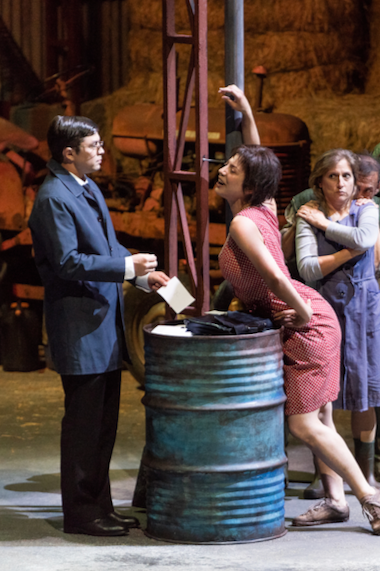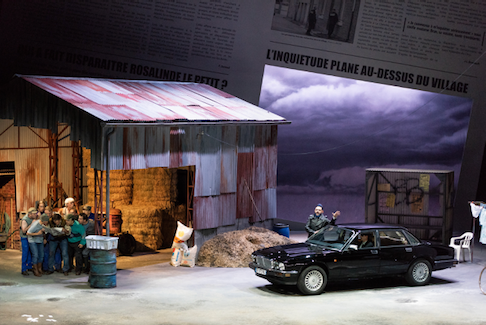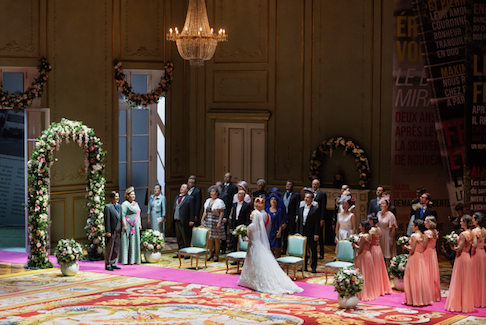Recently in Reviews
English Touring Opera are delighted to announce a season of lyric monodramas to tour nationally from October to December. The season features music for solo singer and piano by Argento, Britten, Tippett and Shostakovich with a bold and inventive approach to making opera during social distancing.
This tenth of ten Live from London concerts was in fact a recorded live performance from California. It was no less enjoyable for that, and it was also uplifting to learn that this wasn’t in fact the ‘last’ LfL event that we will be able to enjoy, courtesy of VOCES8 and their fellow vocal ensembles (more below …).
Ever since Wigmore Hall announced their superb series of autumn concerts, all streamed live and available free of charge, I’d been looking forward to this song recital by Ian Bostridge and Imogen Cooper.
The Sixteen continues its exploration of Henry Purcell’s Welcome Songs for Charles II. As with Robert King’s pioneering Purcell series begun over thirty years ago for Hyperion, Harry Christophers is recording two Welcome Songs per disc.
Although Stile Antico’s programme article for their Live from London recital introduced their selection from the many treasures of the English Renaissance in the context of the theological debates and upheavals of the Tudor and Elizabethan years, their performance was more evocative of private chamber music than of public liturgy.
In February this year, Albanian soprano Ermonela Jaho made a highly lauded debut recital at Wigmore Hall - a concert which both celebrated Opera Rara’s 50th anniversary and honoured the career of the Italian soprano Rosina Storchio (1872-1945), the star of verismo who created the title roles in Leoncavallo’s La bohème and Zazà, Mascagni’s Lodoletta and Puccini’s Madama Butterfly.
Evidently, face masks don’t stifle appreciative “Bravo!”s. And, reducing audience numbers doesn’t lower the volume of such acclamations. For, the audience at Wigmore Hall gave soprano Elizabeth Llewellyn and pianist Simon Lepper a greatly deserved warm reception and hearty response following this lunchtime recital of late-Romantic song.
Collapsology. Or, perhaps we should use the French word ‘Collapsologie’ because this is a transdisciplinary idea pretty much advocated by a series of French theorists - and apparently, mostly French theorists. It in essence focuses on the imminent collapse of modern society and all its layers - a series of escalating crises on a global scale: environmental, economic, geopolitical, governmental; the list is extensive.
For this week’s Live from London vocal recital we moved from the home of VOCES8, St Anne and St Agnes in the City of London, to Kings Place, where The Sixteen - who have been associate artists at the venue for some time - presented a programme of music and words bound together by the theme of ‘reflection’.
'Such is your divine Disposation that both you excellently understand, and royally entertaine the Exercise of Musicke.’
Amongst an avalanche of new Mahler recordings appearing at the moment (Das Lied von der Erde seems to be the most favoured, with three) this 1991 Mahler Second from the 2nd Kassel MahlerFest is one of the more interesting releases.
‘And there was war in heaven: Michael and his angels fought against the dragon; and the dragon fought and his angels, And prevailed not; neither was their place found any more in heaven … that old serpent … Satan, which deceiveth the whole world: he was cast out into the earth, and his angels were cast out with him.’
If there is one myth, it seems believed by some people today, that probably needs shattering it is that post-war recordings or performances of Wagner operas were always of exceptional quality. This 1949 Hamburg Tristan und Isolde is one of those recordings - though quite who is to blame for its many problems takes quite some unearthing.
There was never any doubt that the fifth of the twelve Met Stars Live in Concert broadcasts was going to be a palpably intense and vivid event, as well as a musically stunning and theatrically enervating experience.
‘Love’ was the theme for this Live from London performance by Apollo5. Given the complexity and diversity of that human emotion, and Apollo5’s reputation for versatility and diverse repertoire, ranging from Renaissance choral music to jazz, from contemporary classical works to popular song, it was no surprise that their programme spanned 500 years and several musical styles.
The Academy of St Martin in the Fields have titled their autumn series of eight concerts - which are taking place at 5pm and 7.30pm on two Saturdays each month at their home venue in Trafalgar Square, and being filmed for streaming the following Thursday - ‘re:connect’.
The London Symphony Orchestra opened their Autumn 2020 season with a homage to Oliver Knussen, who died at the age of 66 in July 2018. The programme traced a national musical lineage through the twentieth century, from Britten to Knussen, on to Mark-Anthony Turnage, and entwining the LSO and Rattle too.
With the Live from London digital vocal festival entering the second half of the series, the festival’s host, VOCES8, returned to their home at St Annes and St Agnes in the City of London to present a sequence of ‘Choral Dances’ - vocal music inspired by dance, embracing diverse genres from the Renaissance madrigal to swing jazz.
Just a few unison string wriggles from the opening of Mozart’s overture to Le nozze di Figaro are enough to make any opera-lover perch on the edge of their seat, in excited anticipation of the drama in music to come, so there could be no other curtain-raiser for this Gala Concert at the Royal Opera House, the latest instalment from ‘their House’ to ‘our houses’.
"Before the ending of the day, creator of all things, we pray that, with your accustomed mercy, you may watch over us."
Reviews

30 Jun 2019
Barbe-Bleue in Lyon
Stage director Laurent Pelly is famed for his Offenbach stagings, above all others his masterful rendering of Les Contes d’Hoffmann as a nightmare. Mr. Pelly has staged eleven of Offenbach’s ninety-nine operettas over the years (coincidently this production of Barbe-Bleue is Mr. Pelly’s ninety-eighth opera staging).
Unlike Mr. Pelly’s straight forward, very charming Peruvian fantasy, La Perichole that I saw at the Marseille Opera in 2002, or his parody of The Barber of Seville (sung on top of sheets of musical score paper) seen at the Marseille Opera in 2018 (boasting the hyper personalities of Stephanie d’Oustrac as Rosina and Florian Sempey as Figaro), here Mr. Pelly’s Barbe-Bleue is set on a farm near Paris and in a grand salon in the Élysée Palace, with actors of limited personality.
The real Barbe-Bleue is the 1619 folk fairy tale by Charles Perrault which Offenbach parodies à la Second Empire. But Mr. Pelly’s stretches the parody to include a parody of his own — that of opera stagings which imitate the criminal underworld (Bluebeard is dressed and acts like a mobster) and a parody of mindless operettas (King Bobeche is a pompous fairy tale king with a silly fairy tale court).
 The Farm
The Farm
The time is now or maybe not-so-long-ago. We see a backdrop that is a latest edition newspaper, two front page articles discuss the strange murders. There is a tractor and chicken sounds and some bales of straw to convince us that all this is somehow what real is. Then we see a huge shelf of weekly revues (magazines), those that thrive on news of lurid allure, maybe true and maybe not. It is a side wall of the grand salon in which such tales of the rich and powerful evidently take place.
All this operetta scenery did not add up to a convincing stage for Offenbach’s amusing serial murders, particularly when we saw the refrigerated lockers of a morgue where Bluebeard’s victims are stored. We do know that "bluebearding" women (serial murder of women) is a real, recognized syndrome, but Mr. Pelly and his long-time designer Chantal Thomas only confused us about what may be real and what may not be.
From copious accounts we know that Offenbach’s muse during his very productive years at the Théâtre des Variétés was mezzo-soprano Hortense Schneider. We read of the very great charm of her performances but, alas, we have no digital records of them. Plus what was charming in the Parisian 1860’s may not charm us these days.
It is however the charm, whatever it may be, of an Offenbach heroine that wins our attention and ushers us into his music. The Lyon Boulotte (the Hortense Schneider role) was bravely undertaken by Héloise Mas who can indeed boast Boulotte’s “Rubenesque” body. Mlle. Mas was directed to be a bratty, tomboy rustic — maybe Mr. Pelly’s idea of real — forgetting that first of all Offenbach’s Boulotte must be a comic diva.
 The Palace
The Palace
Bluebeard himself, played by tenor Yann Beuron, was directed to be oily, dangerous and thoroughly unsavory. Though not the usual mild-mannered, reclusive murderer we read about in actual newspaper accounts of such murders, perhaps Mr. Beuron’s Bluebeard fulfilled Mr. Pelly’s idea of a real murderer.
If the two protagonists of the Lyon Barbe-Bleue were meant to be real, the balance of the cast was rendered quite irreale. Prince Saphir played by Carl Ghazarossian and Popolani played by Christophe Gay were physically willowy, and both had an annoying lock of hair that fell across their faces. Count Oscar was willowy as well. The three men exuded a similar maximal energy in executing their roles while avoiding any distinguishing personality or character.
Fleurette, played by soprano Jennifer Courcier, King Bobeche played by Christophe Mortagne and Queen Clementine, played by Aline Martin were stock operetta characters. The thirty-six choristers were directed as if they were collectively one character — they made unison, abstractly choreographed movements.
Maybe a less slick reading of the score by conductor Michele Spotti and a less slick performance by the Opera de Lyon orchestra might have allowed a bit of Barbe-Bleue’s innate charm to slip through.
Michael Milenski
Cast and production information:
Barbe-Bleue: Yann Beuron; Le Prince Saphir: Carl Ghazarossian; Fleurette: Jennifer Courcier; Boulotte: Héloïse Mas; Popolani: Christophe Gay; Le roi Bobeche: Christophe Mortagne; Le Comte Oscar: Thibault de Damas; La reine Clémentine: Aline Martin. Orchestre et Chœurs de l'Opéra de Lyon. Conductor: Michele Spotti; Mise en scène et costumes: Laurent Pelly; Adaptation des dialogues: Agathe Mélinand; Décors: Chantal Thomas; Lumières: Joël Adam. Opéra Nouvel, Lyon, France, June 22, 2019


